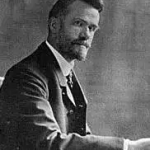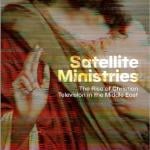Here I begin discussion of Walter Rauschenbusch’s book The Social Principles of Jesus with the first chapter: The Value of Human Life. If you have read the chapter, feel free to comment. If not, feel free to ask a question. In any case, observe the rules stated at the end of this post.
For those who do not know, Walter Rauschenbusch was the leading theologian of the American Social Gospel movement. He died in 1918 after teaching for many years at Rochester Baptist Theological Seminary in New York. He wrote three major volumes: The Social Crisis, Christianizing the Social Order, and A Theology for the Social Gospel.
Like some of you, I suspect, I was raised to think of “social gospel” as a heresy. Only when I read Rauschenbusch did my mind change about that. Yes, it is possibly true that he was not entirely orthodox, but it’s difficult to tell. In A Theology for the Social Gospel he rarely denied any cardinal doctrine of the Christian faith. But he did reinterpret some, such as original sin, to fit with the “new” thinking of the Progressive Movement. However, he argued that his reinterpretations were not unbiblical even if they were sometimes non-traditional.
In this chapter, The Value of Human Life, Rauschenbusch argues that Jesus regarded all people, even the lowliest in the eyes of society, as loved by God and therefore people of inherent dignity and worth. Although he does not name it “Social Darwinism,” he outlines the enemy and identifies it and argues that Jesus rejected it. That is the idea that since nature weeds out the weak so should we, by neglect if not by force.
Recently here I claimed that there are two kinds of people—individualists and organicists—and asked which Jesus was. And which Christians should be.
One thing is clear from this chapter: Rauschenbusch believed Jesus regarded humanity as an organism with every member responsible for every other member.
Up until the Social Gospel, Christians in America (and elsewhere, I’m sure) thought of Christian social feeling as displayed through charity. The problem Rauschenbusch and I have with that is that even Christians are sinfully given to defining the “worthy poor” as people who are like us—at least in terms of our “work ethic.” And we often broaden that to mean that the “worthy poor” (worthy of our charity) are good citizens, hard working (if they can be), and of strong character. Then we tend to overlook those who are down-and-out because of systemic forces, prejudices, generational poverty, mental disability, etc.
And in Rauschenbusch’s time, and ours, it was becoming manifest to anyone who had eyes to see that charitable organizations and churches could not bear the burden of making life livable for everyone. So Rauschenbusch and the Social Gospel Movement called on the government to step in and help everyone. Not necessarily with cash but with life’s necessities, especially equal opportunity to thrive. Rauschenbusch believed that Jesus would urge his followers with government power (and almost all government leaders in his day claimed to be Christians) to move beyond private charity to welfare. Welfare through things like free public education (with all public schools being equal), rights of workers to strike (extremely controversial in his time), and jobs provided by the government especially in times of economic distress.
But, in this chapter, Rauschenbusch is simply laying out Jesus’s high regard for every individual’s life regardless of his or her social status. That’s the beginning, the foundation of a Christianized society or of a Christian social consciousness.
What does that mean for us in America today with regard to immigrants, even those who are here among us without legal standing? Rauschenbusch talks in this chapter about anti-immigrant sentiment and suggests it is not consistent with the social principles of Jesus. Many Americans think they think that there’s a difference in kind between legal immigrants and illegal immigrants and that it is okay to hate illegal immigrants and disregard their very humanity in how we treat them. But would Jesus think that? He commanded us to love everyone. How are we loving illegal, undocumented immigrants as we tear them away from their families, jobs, homes, and crowd them into concentration camps (whatever they are called) for possible deportation to places they have never been and do not know (e.g., South Sudan)?
And do we acknowledge history which tells us that many of our own ancestors came to America (or its predecessor places) illegally? The first immigrants to North America from Europe were not legal in a moral sense. They simply took over land from the indigenous people. Texas belonged to Mexico when thousands of illegal American immigrants flooded into it and took it away from Mexico.
Am I suggesting that Jesus would abolish borders and boundaries? No, but I am suggesting he would condemn harsh treatment of those who live among us just because they are here without our permission. He would certainly condemn the hatred many even Christian express toward them solely because they are “illegals.” And the fact that many even Christians truly hate them because they are brown and speak Spanish.
*Note: If you choose to comment, make sure your comment is relatively brief (no more than 100 words), on topic, addressed to me, civil and respectful (not hostile or argumentative), and devoid of pictures or links.”













